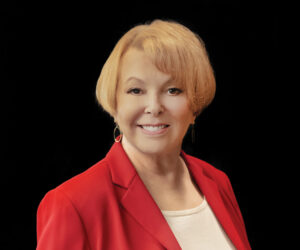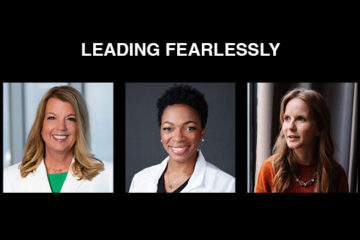
Roxanne Conlin may best be known for championing several civil rights causes in her law practice and suing institutions for various forms of discrimination, particularly advocating for women. She’s won cases giving more rights to pregnant workers, survivors of rape and women who have been sexually harassed in the workplace.
At 80, she’s still practicing law full time and says, “I am going to sue these companies that do not take action in the face of sexual harassment until the day I die. Count on that.”
Or perhaps she is best known for being the first female nominee for governor on a major party ticket in Iowa when she ran against Terry Branstad in 1982. Though she lost the election, she received letters from women and girls who were inspired to run for office after seeing her campaign. Since her run, she’s hosted many fundraising events for other women running for office.
But many may not know that Conlin loves ballroom dancing. So much so that when I called to line up the interview for this story, she was on a ballroom dancing cruise sailing up the east coast. Given Conlin’s passion for gender equity, it’s probably not surprising that some of the best friends she’s made through dancing are also trailblazing women, including Donna Barbisch, a Vietnam war veteran who obtained the rank of major general in the U.S. Army, and the late Doris Lors, who earned a Ph.D. back in 1940.
The Business Record named Conlin the first Women of Influence Alum of the Year, a new annual award launched to celebrate the 25th anniversary of Women of Influence. She was honored in 2000, the first year of the awards. Business Publications Corp. Chair Connie Wimer launched the program to recognize women who were making a difference in the community but were seldom recognized. All those who’ve received the award in the past were invited to nominate fellow alumni who’ve continued making an impact since being honored by the Business Record.
Jann Freed, a leadership development consultant and 2024 Woman of Influence, nominated Conlin.
“Roxanne is still standing strong and marching forward,” Freed said. “She was in the first cohort and she is still a Woman of Influence. She is a giver in so many ways — a giver of her time, talents and energy. Roxanne is admirable, inspirational and a role model.”
I recently interviewed Conlin about her advice for others and some of the biggest moments of her life. I asked what she would wish for, as it relates to gender equity, if she could wave a magic wand. She said, “Because employment is so important, because it governs our lives, it makes everything else possible, I would wish that women everywhere would be able to do every job for which they were qualified without any kind of discrimination, without sexual harassment.”
The following Q&A has been edited for clarity and brevity.
Tell me advice that you have for other women who want to be trailblazers.
There are still plenty of trails to blaze, but there are so many trails that have been blazed. I look back on the women’s movement for more than 60 years. In that period of time, we have made enormous progress. The laws affecting the rights of women have changed from such atrocious things as women not being able to lift more than 10 pounds, women not being able to work more than eight hours a day, the so-called protective legislation that kept women out of important jobs, women not being able to get credit in their own names.
In terms of my advice to women: Be flexible. Don’t get locked into any one position, to any job. Keep your options open. Learn to turn on a dime — that’s very good advice for trial lawyers, I can tell you that. I know it’s not possible for everybody, but you should think about what makes you happy, what brings you joy. For many people, that’s a pipe dream. They work all day, every day, to support their families. But for those who have some choices, choose to be happy.
What do you mean by flexibility?
New things will always come up, things you did not anticipate, things you could not have anticipated. You have to be flexible enough to incorporate them into whatever it is you’re doing. You can’t expect things to be static. Things are never static. Change is life.
People can often be afraid to take risks or fail. What have you learned in your career through what you might have considered failures or mistakes?
I ran for governor of Iowa in 1982 and I lost. My husband said most people never say no to me. More than 500,000 people said no to me on the same day. I have to admit that it took me a long time to recover from that. It was more of a cause than a campaign. I had thousands of volunteers, many of whom went on to run for office themselves, and I’m very proud of that. I got thousands of letters, including letters from young women and grade school girls, who thought that my running was something that could affect their lives in a positive way. So I learned not to give up, but I also learned that you can recover from anything, that life goes on, that it’s never forever.
In 1992 I was arrested for drunk driving in my own driveway. I was a part of Mothers Against Drunk Driving for crying out loud. So it was embarrassing; it was horrifying. They took me to jail. My mug shot appeared in the Des Moines Register. That felt like a very serious personal failure on that day.
I have lost cases, and that always feels terrible — terrible for me, terrible for my client. I go to bed for 24 hours and cover my head. The one thing that keeps me from being depressed about trial losses is we do absolutely everything we can to win a case. We spend every dollar, we spend every hour, we comb through the internet, we do everything possible to win our cases. So if we don’t win, we’re very disappointed for our clients, but we know that we did everything that we could, and that gives us some comfort. Thank God we don’t lose too much.
What do you do in those immediate days after a failure to recoup?
I comfort myself by watching mindless television and reading trashy novels. After my loss of the governor’s race, it took me some months to recover from that, and I literally wore out a pair of slippers because I just didn’t feel like I could leave the house. I lost the race in November, and the first speech I gave after that was in January — two full months to get out of the house. And even then, it took me another several months to go to work. That’s when I went to work in the private practice of trial law.
A lot of people probably wonder, why are you still doing all that you do professionally and for the community at 80?
I practice law full time. The reason I do it is because I love it. It is my cause. It is what makes me happy. The only people I see in my practice are people to whom something terrible has happened. They’ve been run over by a car, or they have gone to a doctor who’s done the wrong thing rather than the right thing. They have been the victims of discrimination or constitutional violations. Everybody that comes through my door or everyone that calls on the phone has had something terrible happen to them. We have to turn down a whole bunch of people, but those people that we take, it makes me so happy to be able to help. That’s why I continue to practice law.
Where did you get the drive to do that?
I experienced sexual harassment in 1968 in a job, which was devastating to me. I’ve experienced discrimination all the time. In law school it was really difficult for all male professors looking out into their class and seeing me, the only college-aged woman, with the red hair — just drove them crazy! The rumors were rampant that I got good grades. How could this girl get good grades if she was not sleeping with all the professors? That was the rumor, and that’s one of the reasons I married so quickly, because I wanted to stop this rumor. But it didn’t stop. That was a good lesson. You have to confront discrimination and harassment directly. You can’t pretend it’s not there. If you do not confront it directly, it’ll get worse.
What excites you about the upcoming generations of women behind you?
I am excited by the freedom that young women today have grabbed. I think most young women don’t feel bound by old rules. They don’t feel bound by stereotypes. They don’t feel bound by what has come before. They want to do what they want to do, and they want people to get the heck out of their way.
Studies have found that women are less likely than men to apply for a position if they don’t think they’re fully qualified. What do you make of this?
Young women: Do what you want to do and apply where you think you could make a contribution. Pay less attention to the written qualifications than to the qualifications in your soul, the things that you think you can do. Just go do it. The statistics that I have read with respect to this, women starting new businesses are pretty impressive, and that, I think, comes from those women who could not find a place for themselves in the world as it existed and decided to do it themselves.
What influence do you hope to have made on the community and world?
I’m now history. Kids call me because they’re doing a project for their social studies class, and they want to write about my life. My hope would be that I’ve lived my life in such a way that I can influence other women to go for what they want — not for what they’re supposed to do, not for what their mom or dad wants them to do, not for what their kids want them to do, but what they want to do. Most of our lives are spent working. So I sure as heck would not want to be doing something I didn’t want to do.

